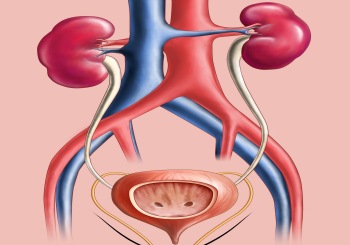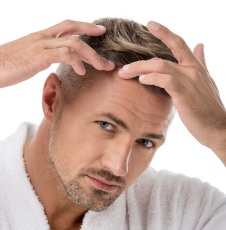What is Pumpkin Seed Oil?
Pumpkin seed oil, extracted from the seeds of Cucurbita pepo, contains high levels of antioxidants and beneficial unsaturated fats like omega-6 and omega-9. Primarily produced in Austria and Slovenia, this oil has a rich, nutty flavor and vibrant green color that makes it popular both for cooking and potential health benefits. Of course, you can also get pumpkin seed oil from eating pumpkin seeds. But, the seeds are high in fiber and fat so you have to keep that in mind if you’re going to consume high amounts of them.
Historically used in herbal medicine, pumpkin seed oil is thought to promote hair growth and hair health. It contains tocopherols, a form of vitamin E with powerful antioxidant properties. Antioxidants protect hair follicle cells from damage by compounds called free radicals.
The oil also provides essential fatty acids that may nourish the scalp and hair to support stronger, healthier hair growth. Additionally, some research finds that constituents in pumpkin seed oil may inhibit the enzyme 5-alpha reductase, which converts testosterone into dihydrotestosterone (DHT)—a hormone linked to hair loss.
While more comprehensive research is needed to fully understand the effects of pumpkin seed oil on hair, early findings suggest it may promote hair health. Still, the specific mechanisms by which it could stimulate hair growth or slow hair loss remain unclear. Controlled studies are necessary to isolate the impacts of pumpkin seed oil from other variables.
What is Saw Palmetto?
Saw palmetto is a plant native to the southeastern United States, primarily found in Florida. It produces small berries that have been used for centuries in traditional medicine by Native American tribes. Extracts from the berries are commonly used as a herbal remedy, particularly known for its potential to support prostate health in men by potentially reducing symptoms associated with benign prostatic hyperplasia (BPH), such as frequent urination. Saw palmetto is also explored for its possible benefits in promoting hair health and treating certain hormonal imbalances in both men and women.
Is Saw Palmetto The Same as Pumpkin Seed Oil?
Saw palmetto and pumpkin seed oil do share some similarities in terms of their potential health benefits:
Prostate/urinary health: Both saw palmetto and pumpkin seed oil have been used in traditional and herbal medicine for supporting prostate and urinary function. They contain similar compounds like plant sterols and fatty acids that may help inhibit testosterone uptake in prostate tissue, which could improve urinary symptoms associated with enlarged prostate (benign prostatic hyperplasia or BPH).
Hair growth/health: There is some preliminary evidence that both saw palmetto and pumpkin seed oil may inhibit the enzyme 5-alpha reductase, which is involved in production of dihydrotestosterone (DHT) – a hormone linked to male pattern hair loss. This mechanism could aid hair growth or slow hair thinning. However, robust clinical evidence is still lacking.
Anti-inflammatory effects: Some research shows that phytosterols and antioxidants in both oils have anti-inflammatory properties. This could help with inflammatory conditions like BPH but more studies are needed specifically on these oils.
Nutrient content: Both contain beneficial nutrients like fatty acids, plant sterols, antioxidants, and minerals that may contribute to prostate, urinary tract, and hair health – though the specific concentrations can vary between the two.
There are a few key differences between saw palmetto and pumpkin seed oil in terms of their makeup and potential effects:
Source – Saw palmetto comes from the berry extracts of the Serenoa repens plant while pumpkin seed oil comes from pressed pumpkin seeds.
Composition – Saw palmetto contains specific fatty acids like lauric acid and plant sterols like beta-sitosterol. Pumpkin seed oil contains high amounts of vitamins, zinc, magnesium, omega fatty acids and other antioxidants.
Research – More extensive research in humans exists exploring saw palmetto for urinary/prostate health compared to pumpkin seed oil, though evidence is still limited. Data on hair benefits is very minimal for both.
Dosing – Typical doses differ, with saw palmetto supplements usually around 320mg per day while pumpkin seed oil doses may be around 1000mg. This suggests they may interact differently biologically.
Side effects – Saw palmetto does not appear to significantly impact hormone levels while some animal studies show pumpkin seed oil may decrease testosterone. Overall, the impacts on humans are unclear. Saw palmetto may be more likely to cause mild stomach upset.
So while there’s some overlap in their purported mechanisms of action, saw palmetto and pumpkin seed oil have key differences in terms of the active compounds they contain, dosage recommendations, known side effects, and extent of research specifically demonstrating their efficacy. More studies evaluating these distinct aspects could shed more light on how these supplements may complement or contrast with one another biologically.
Effects of Pumpkin Seed Oil and Saw Palmetto
Here’s a quick overview of the documented and anecdotal effects seen from pumpkin seed oil and saw palmetto:
Pumpkin Seed Oil
- May help urinary function and reduce symptoms related to benign prostatic hyperplasia (BPH) in men
- Anti-inflammatory effects that could benefit prostate health
- May inhibit production of DHT, a hormone linked to hair loss
- Anecdotal evidence for hair growth promotion and treating hair thinning
- Studies show can lower cholesterol and blood pressure
- May reduce risk of bladder stones based on animal studies
- High vitamin E content contributes an antioxidant effect to protect cells
Saw Palmetto
- Shown to help with urinary symptoms associated with enlarged prostate in men
- Appears to have anti-inflammatory and anti-androgen effects from plant sterols like β-sitosterol
- May aid hair growth according to observational and some preliminary studies
- Traditionally used for supporting reproductive health and libido
- May have antioxidant properties that protect cells from damage
- Some indication it could help with asthma symptoms and lung health
- Are a few cases of liver damage reported when taken in very high doses
Most evidence-based effects of these supplements relate to improving urinary function and assisting with benign prostatic hyperplasia (BPH). Data on hair benefits remain limited despite some initial promising indications. Further research is warranted on broader effects. But they appear modestly helpful and relatively safe supplements when taken appropriately under medical guidance.
Can I Take Saw Palmetto and Pumpkin Seed Oil Together?
It is generally considered safe to take saw palmetto and pumpkin seed oil supplements together. In fact, there is some research showing positive effects on prostate/urinary symptoms when combining saw palmetto and pumpkin seed oil.
Some key points about using these together:
- Several studies have shown that taking pumpkin seed oil together with saw palmetto improved urinary flow, reduced frequent nighttime urination, and helped with other symptoms linked to an enlarged prostate. The combination may be more beneficial than saw palmetto alone.
- However, most studies showing a beneficial effect of using these together for prostate health have been small and short term. More extensive, long-term research is still needed.
- No studies have really looked at taking both specifically for hair health, so it’s unclear if there is added benefit for hair loss prevention or growth when combining the two. Although, there are videos on YouTube claiming a beneficial result but these are anecdotal.
- As with any supplements, start with lower doses of each when using together to assess tolerance and check for any potential side effects.
- Saw palmetto may interact with some medications like blood thinners, so speak to your doctor before using both supplements if you take any medications regularly. Monitor for unusual bleeding or bruising.
While more research would still be helpful, the current evidence does suggest you can safely take pumpkin seed oil with saw palmetto supplements and potentially see some benefit for prostate/urinary health.
Saw Palmetto and Pumpkin Seed Oil for Prostate
Several research studies have investigated the effects of taking saw palmetto together with pumpkin seed oil on benign prostatic hyperplasia (BPH) symptoms and other prostate issues. Here is a summary of the evidence:
- A 2016 double-blind trial published in Research and Reports in Urology gave 555 men with BPH either a combined supplement with pumpkin seed oil and saw palmetto extract or just the saw palmetto alone. After 6 months, the combination group had significantly greater improvements in symptoms than saw palmetto only. Urinary symptom scores, urinary flow, and frequency of nighttime urination improved more with the combination supplement.
- A smaller 2010 study followed 47 men with BPH taking either a combined extract of Sabal serrulata (a species of saw palmetto) plus pumpkin oil extract or a placebo without the active supplements. After 6 months, the treatment group had improved peak urine flow (+9.2 mL/s) and fewer nighttime bathroom trips (-44%) indicating better prostate health and bladder function.
- A review published in 2018 looked at all randomized controlled trials using pumpkin seed oil and saw palmetto together for BPH treatment. Analysis of study data found that combination was linked to statistically significant improvements in quality of life scores, decreased nighttime urinary frequency (nocturia), increased urinary flow rates, and lower post-void residual urine volume compared to placebos or baseline measurements.
Overall, while some studies are small, there is promising clinical evidence that taking saw palmetto together with pumpkin seed oil supplements can effectively and safely improve urinary tract symptoms associated with an enlarged prostate. Data shows additive or synergistic effects when combined compared to individual use of saw palmetto alone. More research on optimal dosing and long term efficacy would be beneficial.
Saw Palmetto and Pumpkin Seed Oil for Hair Loss
There is currently very limited research investigating the combined use of saw palmetto and pumpkin seed oil specifically for hair loss or hair growth promotion.
The existing evidence regarding each supplement individually for hair health is also sparse:
- Only one or two small studies exist exploring saw palmetto alone for androgenetic alopecia (male or female pattern baldness). They show very modest improvements in hair count/hair mass comparable to the medication finasteride. However, robust randomized controlled trials are still lacking.
- A couple of in vitro and animal studies suggest components in pumpkin seed oil may inhibit 5-alpha reductase and interfere with DHT production. This mechanism could potentially block hair loss pathways. However, direct clinical studies confirming this effect or any hair growth benefits in humans are missing.
- Some preliminary traditional and anecdotal evidence pertains to each supplement helping with hair thinning separately when taken orally or topically. But clinical evidence does not yet confirm these individual effects, let alone any additive effects when combining the supplements.
So, while pumpkin seed oil and saw palmetto show promise for management of urinary/prostate symptoms related to BPH, any research on the efficacy of using these supplements together to specifically promote hair growth or slow balding is lacking. Some initial mechanisms look plausible but remain unvalidated without controlled human trials.


